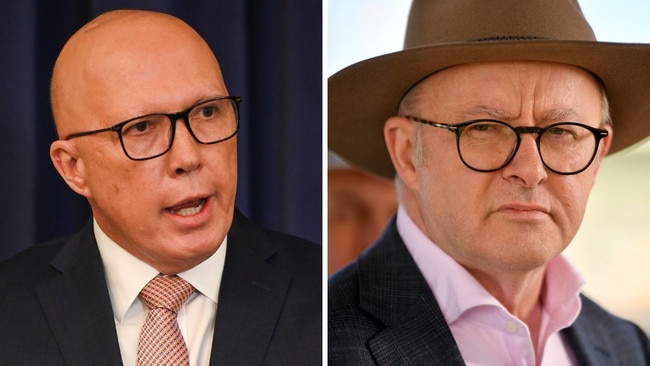Newspoll: Less than a third want Anthony Albanese as Labor leader, Peter Dutton no better off
As the odds of a minority government at the next election increase, less than a third of voters say Anthony Albanese is their preferred leader of the Labor Party.

Australia is battling a drought of confidence in its political leadership, as less than a third of voters say Anthony Albanese is their preferred leader of the Labor Party and the odds of a minority government at the next election continue to increase.
Peter Dutton also struggles to get a majority of all voters to back him as their preferred leader of the Coalition and he still trails the Prime Minister in a head-to-head match up, despite making strength of leadership a central plank of his campaign against Labor.
An exclusive Newspoll conducted for The Australian shows only 28 per cent of voters nominated both Mr Albanese and Mr Dutton as their preferred leaders of their respective parties, ahead of five other chosen candidates, with more voters unable to nominate anyone as their favoured leader.
Despite Labor maintaining a lead in the two-party-preferred stakes, Mr Albanese’s disapproval rating is now higher than Mr Dutton’s, and the preferred prime minister contest has narrowed to just seven points in Mr Albanese’s favour.
This is the closest margin between Mr Albanese and Mr Dutton since the 2022 election. In a special Newspoll question, Mr Albanese was clearly favoured as the preferred Labor leader among Labor voters at 59 per cent.
Environment Minister Tanya Plibersek was backed by 13 per cent of voters generally but enjoyed equal support among Greens voters and was favoured over Mr Albanese among those voting for minority parties and independents.
Former Labor leader and NDIS Minister Bill Shorten was the third pick overall among voters, with 10 per cent support averaged across all demographics. Jim Chalmers, who has strong leadership ambitions, enjoyed only 8 per cent support, reflecting his role as a Treasurer in charge of trying to ease cost-of-living pressures.
Deputy Prime Minister and Defence Minister Richard Marles and Climate Change Minister Chris Bowen had only nominal backing at 5 per cent and 2 per cent respectively.
Mr Dutton received majority backing among Coalition voters at 54 per cent but only 28 per cent of all voters chose Mr Dutton over potential Liberal Party rivals.
Country Liberal and opposition Indigenous affairs spokeswoman, Jacinta Nampijinpa Price was the next most favoured with 14 per cent, followed by deputy Liberal leader Sussan Ley at 6 per cent.
Senator Nampijinpa Price, while a member of the CLP, is a senator who sits in the Nationals party room and therefore would by convention be required to switch to the house and align with the Liberal Party to be a leadership contender.
Senator Nampijinpa Price, who was a key voice in the Coalition’s campaign against the Indigenous voice to parliament, was more favoured than Mr Dutton among Greens voters and other minor party and independent voters.
Opposition Treasury spokesman Angus Taylor and opposition defence spokesman Andrew Hastie were backed by 5 per cent of voters as their preferred Coalition leader followed by opposition immigration spokesman Dan Tehan on 3 per cent.
The findings of the special leaders’ survey showed a significantly high number of voters – more than third – opting for none of those nominated, suggesting both parties were suffering a crisis of confidence in the leadership ranks of both major parties.
The latest Newspoll shows the Coalition lifting two points in primary vote support to 38 per cent following a troubling fortnight for the government, which included the defection of Muslim Labor senator Fatima Payman to the crossbenches over her support of a Palestinian state and the forced disaffiliation of the CFMEU from the Labor Party over allegations of criminal behaviour.
Labor, however, also improved marginally, with a one-point increase to 33 per cent, with the negative political consequences of the internal strife potentially offset by the July 1 tax cuts which have started to appear in worker pay packets over the past two weeks. The latest Newspoll, however, shows Labor maintaining its 51-49 two-party-preferred lead over the Coalition. If reflected in a general election on a universal level across all seats, the results would indicate a potential minority Labor government. Support for independents and other minor parties fell two points to 10 per cent while the Greens remained stable at 13 per cent and Pauline Hanson’s One Nation party shed a point to 6 per cent.
Both leaders also showed marginal increases in approval ratings, with Mr Dutton recording his best result since becoming leader with a three-point gain to 41 per cent and a five-point fall in dissatisfaction to 49 per cent, giving the Liberal leader a net negative approval rating of minus eight.
Mr Albanese’s approval ratings also improved two points to 44 per cent against a fall in disapproval of two points to 51 per cent.
Mr Dutton also gained a point in the head-to-head contest over who voters believed made the better prime minister, with only a seven-point margin now separating the leaders, which is also the closest margin in the contest since both were elected leaders.
Mr Dutton was backed by 54 per cent of Coalition voters as their preferred leader.
Mr Albanese was least supported among 50 to 64-year-old voters compared his rivals, while Mr Dutton was the most popular among the over-65 age group, with 37 per cent support.
Mr Dutton’s approval rating with over-65s was the highest level of support among any demographic for either leader.
This survey was conducted between July 15 and July 19, with 1258 voters throughout Australia interviewed online. The previous survey was conducted three weeks ago.




To join the conversation, please log in. Don't have an account? Register
Join the conversation, you are commenting as Logout